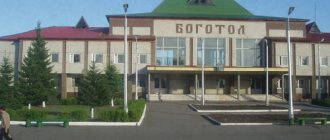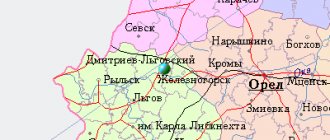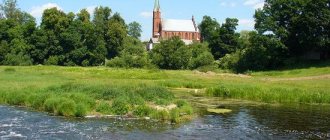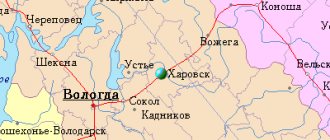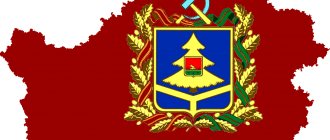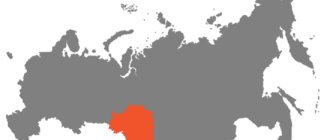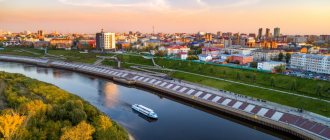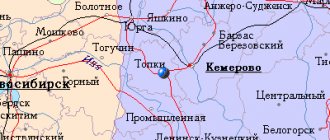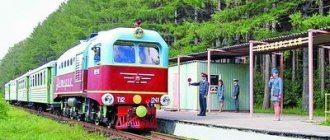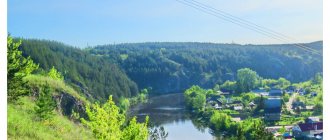More about the districts of the Saratov region here.
Ershov is a small town in the Saratov region, located at the source of the Maly Uzen River. The distance from the regional capital, the city of Saratov, to Ershov is 180 km. Ershov occupies an area of 343 square meters. km.
The first mention of human settlements in this area dates back to the mid-18th century. According to the decree of Catherine the Second, people from all over Ukraine and the central part of Russia came here to develop new lands.
Those who were guilty and unwanted were also sent into exile here. For example, for supporting the Poles in the uprising, some Lithuanians were exiled here. Due to the mixing of blood, you can still often meet people of European appearance here - blond, almost white hair combined with transparent blue eyes.
There is one interesting version of the origin of the city's name. The engineer who was entrusted with the construction of the station bore the surname Ershov. As expected, the engineer hired workers from the surrounding villages. The following dialogue often took place between builders during a meeting:
-Whose will you be?
- Ershov.
And so it happened. Subsequently, everything that was built here began to be called Ershov.
Now the ruff is officially placed on the city’s coat of arms.
Coat of arms of the city of Ershov in the Saratov region
According to official data, the city's population today is about 20 thousand people. But once upon a time Ershov was a small settlement that formed near the station of the same name.
In just a hundred years, Ershov has turned into a modern administrative center with developed infrastructure, industrial enterprises and its own television.
Ershov was founded in 1893 in connection with the construction of the Ryazan-Ural railway. Already in 1904, the first school appeared here. This fact perfectly confirms the rapid population growth of the then small village.
In 1923, the first library appeared (at the moment there are two), and a few years later the first newspaper “Leninsky Put” was published.
In 1928, Ershov acquired the status of a district center, and since 1963, it has been included on the map of Russia as a city.
From 1936 to the present day, Ershov has been part of the Saratov region. Previously, the village was listed as part of the Samara province.
At the moment, the city is one of the main road and railway hubs in Russia. The paths diverge in all directions.
Trains go to Saratov and Moscow, in the opposite direction to Central Asia, Siberia and the Urals. They also head towards Balakovo and Pugachevo, two more large administrative centers of the region.
Construction of the locomotive depot began at the end of the 19th century. At the same time, the construction of workshops began to eliminate minor problems with rolling stock. Already in the first years of the 20th century, more than 10 thousand passengers and about 12 tons of various cargo departed from the station.
Nowadays, at the Ershov station there is already a large locomotive depot and a full-fledged car repair shop with a large number of workshops.
The agricultural sector plays a significant role in the city's economy. More than 60 private farms and 18 state agricultural enterprises are officially registered in the Ershovsky district.
The priority area of agriculture is livestock farming, a smaller share falls on crop production.
There are several mineral springs and crushed stone deposits in Ershov.
In the city itself and its surroundings there are several large industrial enterprises of a state scale. For example, the main base for the manufacture and repair of agricultural machinery and equipment, the Ershovskaya base is engaged in the production of agricultural products and equipment, Promstroyinvest LLC is a brick production plant, and Alliance-Nedra LLC is engaged in the extraction and processing of crushed stone.
Nowadays, Ershov is a small but quite modern industrial city. There is everything for a comfortable stay here. Ershov has about 40 kindergartens, more than 20 schools, music and sports schools, various clubs and sections for children and adults, it has its own house of culture and creativity, a cinema and libraries. The city has several technical schools and a branch of Saratov University.
The local history museum requires a separate description. It is located in the building of the Palace of Pioneers. In appearance, this is an unremarkable two-story panel house, but when you go inside, you seem to find yourself back in time, a hundred years ago.
Everything here is imbued with the spirit of antiquity. In addition to household items of the first settlers, old photographs and maps, there are some very interesting exhibits.
For example, the suitcase with which Vasily Kuzmich Stepin, one of the first settlers of the city, arrived. Vasily Kuzmich came to settle in new lands together with his entire family and a trust document, which was presented at the request of the gendarmerie, and gave the right to build a house, work and settle legally.
The director of the museum, Olga Fedotova, also deserves special attention. On one of the walls of the museum hangs a photo of her grandmother, who was married off at the age of sixteen. The husband was as old as he was rich.
The continuation of this intriguing story can be heard from Olga Fedotova herself, if you ask about it.
The museum is generally more inclined to preserve the chronicles of life and memoirs of the Ershovites themselves, their so different: complex and not so complex destinies.
What other places can you visit and see in the city?
The central city square is also quite worthy of attention. In the center, as in most other Russian cities, there is a monument to the leader of the proletariat, V.I. Lenin.
The square is very beautifully and harmoniously organized and fits into the overall city flavor. There is a pedestrian area for walking.
Another interesting architectural monument is the “House of Gentlemen Machinists”. If you have free time, you can arrange a short free excursion.
You can visit the railway museum, which is located on the territory of the locomotive depot.
Content
- 1 About the surname
- 2 Ershev
2.1
XVII-XIX centuries - 2.2 Privileged class
- 2.3 Unprivileged class
- 2.4 XX century
- 2.5 Ershev.Geography
of residence - 2.6 Sources:
- 3.1 XVII-XIX centuries
of residence
Culture and education
The city operates:
- The House for arts and crafts for children
- road technical school
- branch of Saratov State University
- two city libraries
- editorial office of the newspaper "Stepnoy Krai"
- two houses of culture - city and district
- sports section for children with disabilities “RIF”
- 6 city schools (MOU “Secondary School No. 3” is the largest)
- cinema "Youth"
- branch of the Saratov Technical School of Railway Transport
- big stadium "Yunost"
- FOK "Balkany", FOK "Dolphin"
- art school
- branch of the agricultural technical school
- local history museum
Books about Ershov
- “Bonfires in the steppe”, A. P. Room, 1993
- “The City of Ershov”, Valeev V.Kh., Kuznetsov S.P. Saratov: Volga Book Publishing House, 1984. – 104 p., ill. – (Series “Cities of the Saratov Region”). Historical and local history essay about the Trans-Volga city of the Saratov region, about its wonderful people.
Mass media
A television
The city of Ershov had its own television “TVC Ershov TV”. The television is currently closed.
Newspapers
- Regional newspaper "Steppe Krai".
Radio
see article Radio stations of the Saratov region
Sources:
- Memorable books of Russian provinces.
- Resettlement lists.
- Ownership lists.
- World War I. Irreversible losses.
- Civil War. Lists of losses.
- Military conflicts 1923-1939 Lists of dead military personnel.
- Repressions 1930-44 Lists of those illegally repressed.
- Great Patriotic War 1941-45. Irreversible losses.
- Great Patriotic War 1941-45. Lists of dead civilians.
- Encyclopedias.
- Heroes of the Soviet Union and order bearers.
- Archives.
- Website "RUSSIAN NOBILITY"
Story
Pre-revolutionary time
Ershov was founded in 1893 in connection with the construction of the Ryazan-Ural Railway as a village at the Ershov station.
On October 25, 1894, the Pokrovsk-Uralsk section was opened. On August 28, 1895, the Ershov-Nikolaevsk branch went into operation. The development of the station was given impetus by the railway. In 1897, Ershov was first mentioned in the report of the Zemstvo Administration of the Novouzensky District as a populated area. Until October 1917, Ershov was part of the Novouzensky district of the Samara province. In June 1928, counties and provinces were abolished and Ershov became part of the Pugachevsky district of the Saratov region of the Lower Volga region. From December 5, 1936 to this day, Ershov has been part of the Saratov region. In 1898, construction of the Locomotive Depot began in Ershov. At the same time, workshops for minor repairs of narrow-gauge steam locomotives were built. More than 12 thousand passengers and up to 750 thousand pounds of various cargo departed from the station per year. At the small station there were no industrial enterprises with the exception of 2 steam mills, in which peasants from the surrounding villages ground grain. Only a few copies of the newspaper “Russkoe Slovo” and “Kopeyka” were subscribed to the entire village. 85% of the population of Ershov were illiterate. By the end of 1914, the population of Ershov exceeded 1000 people. On the eve of the February revolution, 1,200 residents lived here. These were mainly railway workers, workers, loaders and peasants. In 1844, on the left bank of the river. B. Kushum founded a balneological resort, now a sanatorium named after. Chapaeva. In 1900, private enterprises opened in Ershov: the rooms of the merchant Vlasov, the Chakaev butcher shop, the Becker brothers - the former company store of the city food processing plant. The Reshetnikov brothers owned a bakery. In 1904, the first parish school was opened in Ershov (inaccessible link), in 1922-1923. - the first library.
Interwar time and the Great Patriotic War
| This section needs to be completely rewritten. There may be explanations on the talk page. |
After the end of the civil war, the strengthening of the railway junction began in Ershov. In June 1928, Ershov became a regional center. In 1929, the first machine and tractor station was organized. In 1930, the Leninsky Put newspaper was founded. In 1932, to study and research the growth of grain crops in the conditions of dry and irrigated agriculture in the Trans-Volga region, a section of the Institute of Grain Farming of the South-East of the USSR was organized. In 1941, the Komsomolets cinema with 180 seats was built in Ershov. Ershovites fought bravely on the fronts of the Great Patriotic War. Among the dead fellow countrymen: A.F. Danukalov, M.A. Zueve, V.I. Kireev, I.G. Malina, P.E. Sergeev, V.R. Spirina. [source not specified 1423 days].
Post-war time
| This section needs to be completely rewritten. There may be explanations on the talk page. |
Not only in the district, but throughout the region, the names of the leaders in agricultural production are known: Hero of Socialist Labor A.V. Chumak, Hero of Socialist Labor, foreman of the tractor field crew of the Ershovsky state farm N.G. Cheusov. In 1957, there were 54 schools in the area (6 schools in Ershov). The residents of the village had at their disposal a House of Culture, a cinema "Komsomolets", 2 parks of culture and recreation. On the eastern outskirts, large housing construction began, new streets with 2-story buildings began to appear. In 1967, construction began on the Saratov watering and irrigation canal, which was put into operation in 1972. The development of agricultural production in the region and its transfer to an industrial basis had a noticeable impact on the life of the city. He went from a station lost in the steppe to a modern Trans-Volga city.[2]
The city these days...
| This section needs to be completely rewritten. There may be explanations on the talk page. |
Currently, Ershov is a major railway junction. The railway goes to the west - towards Saratov, Moscow, and to the east - to Uralsk, Siberia and Central Asia. A railway line goes to the north to Pugachev and Balakovo. At the Ershov station there is a locomotive depot and a car repair center with spacious workshops. The priority in the economy of the region is the agro-industrial complex. The specialization of agriculture is aimed at crop production and livestock production. There are 18 agricultural enterprises and 63 peasant farms operating in the region. This is the second largest district of the Saratov region, which has one of the largest deposits of crushed stone, as well as sources of mineral waters. There are a number of industrial enterprises operating in the district: -Ershovskaya inter-district supply and repair base “Agrodetal” specializes in the repair and manufacture of agricultural machinery and equipment, as well as in the production of consumer goods. - JSC MTS Ershovskaya specializes in the repair of agricultural machinery and production of agricultural products, OP Chapaevsky branch of LLC SPK Stroydetal, FL LLC Saratovavtodor Novoselsky Mekhkarier, LLC Rosshchebstroy, LLC Alliance-Nedra specialize in the production of crushed stone. -Promstroyinvest LLC specializes in the production of bricks. The city is quite well landscaped. Artificial reservoirs of great economic importance have been created on the outskirts. Near Ershov there is an experimental site of the Scientific Research Institute of Agriculture of the South-East with irrigated fields, gardens and shelterbelts. Ershov gave the Russian state a historian, lawyer, sociologist, publicist and public figure of the era of reforms of Alexander II, one of the ideologists of Russian liberalism - Konstantin Dmitrievich Kavelin (1818-1885). In addition, the famous Russian botanist, academician of the All-Russian Academy of Agricultural Sciences Larin I.V. (1889-1972), who had the title of Hero of Socialist Labor, Honored Scientist of the RSFSR, was born in Ershov and spent his school years.
In the Ershovsky district there are 34 educational institutions, including 23 secondary schools and 9 basic schools, 1 evening school, 38 children's preschool educational institutions, a music school, and a children's and youth sports school. There is also a House of Children's Creativity, a local history museum, two libraries, a branch of an agricultural technical school, a branch of Saratov State University, a road technical school, two houses of culture - city and regional, the large Yunost stadium, the Balkans youth sports school, and the Dolphin sports complex.
Privileged class
Representatives of the Ershov surname belonged to various classes:
- Nobles
.
Alexey Grigorievich Ershov, after the capture of Kazan, in 1552, was sent to various regions of the conquered Kazan kingdom, to bring the inhabitants to the oath to the Russian Tsar; in 1557 he was sent with an army to the Volga to pacify Cossack robberies; in 1563 he was with the Tsar during the Polotsk campaign, and on July 2, 1566 he signed the verdict of the Zemstvo Duma on the war with Poland. His son Ivan Alekseevich participated in the siege and capture of Kazan with the rank of Streltsy head, and also signed the above-mentioned verdict of the Zemstvo Duma.
Gabriel Matveevich, Toropets nobleman, killed during the siege of Smolensk, in 1634; During the same siege, Nikita Fedorovich, a Yaroslavl nobleman, was wounded and died from his wound. Three Ershovs owned inhabited estates in 1699. Vasily Semyonovich (1672—?) - Russian statesman, second governor of the Moscow province.
| "Coat of arms of the Ershov nobles" | Representatives of the family Ershov included in the Genealogical books of the Noble Deputy Assembly:
|
| "Coat of arms of the nobles Ershov-Pavlovich" | Representatives of the family Ershov-Pavlovich included in the Genealogical books of the Noble Deputy Assembly:
I approve. In Tsarskoe Selo on March 14, 1912. Minister of Justice State Secretary Shcheglovitov In an azure shield, there are three golden ruffs. The shield is topped with the Noble Crowned Helmet. Crest: an emerging golden leopard with scarlet eyes and tongue, holding a silver sword with a gold hilt in its right paw. Mantle: azure with gold. Motto: “For God, Tsar-Autocrat and Rus'”, in gold letters on an azure ribbon. by the determination of the Governing Senate, according to the Department of Heraldry, dated April 22, 1909, Staff Captain Vladimir Aleksandrov Ershov-Pavlovich, with his wife Lyubov Sergeeva and their children Melania and Georgy, according to the rank of Ensign received in 1814 by his grandfather, was recognized as hereditary Nobility, with the right to be included in the second part of the Noble Genealogy Book. Date of award: 03/14/1912 |
- Cossacks
.
representatives of the Ershov
are mentioned: Don Army in the Alphabetical Index to the penalty lists of the lower ranks of the Don Army for 1855 and 1865.
Private advertisements in Ershov, in the Saratov region and in Russia
To add an advert
Saratov
Industrial electronics repair servo drive servo motor
Saratov
Specialist in working with customers
Saratov
Free premises, 500 m²
Saratov
BDSM MASK from Love Monster in Saratov
123ru.net
- every minute news with a daily archive. Only here we have all the main news of the day without political censorship. “123 News” - absolutely all points of view, sober analysis, civilized debates and discussions without mutual accusations and insults. If you don’t like it, don’t want to hear it, don’t read it, read it, be mutually polite and correct in your statements. Remember that not everyone's point of view coincides with yours. Respect the opinions of others, even if you defend your views and your position. 123ru.net is a news observer. We do not impose our vision on you, we give you a snapshot of the events of the day without censorship and without cuts. News as it is—online with minute-by-minute archives for all cities and regions of Russia, Ukraine, Belarus and Abkhazia. 123ru.net - live news live! A quick search from 123ru.net is not only the opportunity to be the first to know, but also the advantage of reporting breaking news instantly in any language in the world and being heard right away. You can add your news at any moment - here.
Sources:
- Memorable books of Russian provinces.
- Resettlement lists.
- Ownership lists.
- World War I. Irreversible losses.
- Civil War. Lists of losses.
- Military conflicts 1923-1939 Lists of dead military personnel.
- Repressions 1930-44 Lists of those illegally repressed.
- Great Patriotic War 1941-45. Irreversible losses.
- Great Patriotic War 1941-45. Lists of dead civilians.
- Encyclopedias.
- Heroes of the Soviet Union and order bearers.
- Archives.
- Ershovs - Russian noble families on Wikipedia.
- Website "RUSSIAN NOBILITY"
Economy
Among the main industrial and processing enterprises of the city:
- grain elevator
- carriage depot
- locomotive depot
- poultry plant
- dairy plant
There are also large enterprises operating in the city:
- "Zavolzhskie Electric Networks", branch
- MTS "Agro"
- trading enterprises: “Expert”, “Compumarket”, “Cascade”, chain of stores “Knizhny Mir”
- DRSU
- rem
The city has a 350 m high television and radio mast.
It is an interdistrict center of departments and departments of federal and regional departments: Pension Fund, Social Security Administration, Tax Inspectorate, Prosecutor's Office, LUVDT, Court, Sberbank, Police, etc.
Ershov Station
Population
Population dynamics by year:
| 1910[6] | 1939[7] |
| 589 | 14439 |
| Population | |||||||||
| 1959[8] | 1967[9] | 1970[10] | 1979[11] | 1989[12] | 1992[9] | 1996[9] | 1998[9] | 2000[9] | 2001[9] |
| 19 977 | ↘19 000 | ↗21 731 | ↗22 277 | ↗24 468 | ↗24 600 | ↗25 600 | ↘25 500 | ↘25 400 | ↗25 500 |
| 2002[13] | 2003[9] | 2005[9] | 2006[9] | 2007[9] | 2008[9] | 2009[14] | 2010[15] | 2011[16] | 2012[17] |
| ↘23 848 | ↘23 800 | →23 800 | ↘23 600 | ↘23 500 | ↘23 400 | ↘23 384 | ↘21 448 | ↘21 408 | ↘21 200 |
| 2013[18] | 2014[19] | 2015[20] | 2016[21] | 2017[22] | 2018[23] | 2020[1] | |||
| ↘20 927 | ↘20 763 | ↘20 557 | ↘20 290 | ↘19 993 | ↘19 590 | ↘18 796 |
As of January 1, 2022, in terms of population, the city was in 685th place out of 1115[24]cities of the Russian Federation[25].
An excerpt characterizing Ershov (city)
Pierre blushed the same way he always blushed at this, and hastily said: “I’ll tell you someday how it all happened.” But you know that it's all over and forever. - Forever? - said Prince Andrei. – Nothing happens forever. – But do you know how it all ended? Have you heard about the duel? - Yes, you went through that too. “The one thing I thank God for is that I didn’t kill this man,” said Pierre. - From what? - said Prince Andrei. – It’s even very good to kill an angry dog. - No, killing a person is not good, it’s unfair... - Why is it unfair? - repeated Prince Andrei; what is just and unjust is not given to people to judge. People have always been mistaken and will continue to be mistaken, and in nothing more than in what they consider just and unjust. “It is unfair that there is evil for another person,” said Pierre, feeling with pleasure that for the first time since his arrival, Prince Andrei became animated and began to speak and wanted to express everything that made him what he was now. – Who told you what evil is for another person? - he asked. - Evil? Evil? - said Pierre, - we all know what evil is for ourselves. “Yes, we know, but the evil that I know for myself, I cannot do to another person,” Prince Andrei said more and more animatedly, apparently wanting to express to Pierre his new view of things. He spoke French. Je ne connais l dans la vie que deux maux bien reels: c'est le remord et la maladie. II n'est de bien que l'absence de ces maux. [I know only two real misfortunes in life: remorse and illness. And the only good is the absence of these evils.] To live for yourself, avoiding only these two evils: that is all my wisdom now. – What about love for one’s neighbor, and self-sacrifice? - Pierre spoke. - No, I cannot agree with you! To live only in such a way as not to do evil, so as not to repent? this is not enough. I lived like this, I lived for myself and ruined my life. And only now, when I live, at least try (Pierre corrected himself out of modesty) to live for others, only now I understand all the happiness of life. No, I don’t agree with you, and you don’t mean what you say. Prince Andrei silently looked at Pierre and smiled mockingly. “You’ll see your sister, Princess Marya.” You’ll get along with her,” he said. “Maybe you’re right for yourself,” he continued, after a short silence; - but everyone lives in their own way: you lived for yourself and you say that by doing this you almost ruined your life, and you only knew happiness when you began to live for others. But I experienced the opposite. I lived for fame. (After all, what is glory? the same love for others, the desire to do something for them, the desire for their praise.) So I lived for others, and not almost, but completely ruined my life. And since then I have become calmer, as I live only for myself. - How can you live for yourself? – Pierre asked heatedly. - And the son, and the sister, and the father? “Yes, it’s still the same me, it’s not others,” said Prince Andrei, but others, neighbors, le prochain, as you and Princess Mary call it, are the main source of error and evil. Le prochain [Neighbor] are those, your Kyiv men, to whom you want to do good. And he looked at Pierre with a mockingly defiant gaze. He apparently called Pierre. “You’re kidding,” Pierre said more and more animatedly. What kind of error and evil can there be in the fact that I wanted (very little and poorly fulfilled), but wanted to do good, and at least did something? What evil can it be that unfortunate people, our men, people just like us, growing up and dying without any other concept of God and truth, like ritual and meaningless prayer, will be taught in the comforting beliefs of a future life, retribution, reward, consolation? What evil and delusion is it that people die from illness without help, when it is so easy to help them financially, and I will give them a doctor, and a hospital, and a shelter for the old man? And isn’t it a tangible, undoubted blessing that a man, a woman and a child have no rest day and night, and I will give them rest and leisure?...” said Pierre, hurrying and lisping. “And I did it, at least poorly, at least a little, but I did something for this, and not only will you not dissuade me that what I did was good, but you will also not disbelieve me, so that you yourself do not think so.” “And most importantly,” Pierre continued, “I know this, and I know it correctly, that the pleasure of doing this good is the only true happiness in life. “Yes, if you put the question like that, then that’s a different matter,” said Prince Andrei. - I build a house, plant a garden, and you are a hospital. Both can serve as a pastime. And what is fair, what is good - leave it to the one who knows everything, and not to us, to judge. “Well, you want to argue,” he added, “come on.” “They left the table and sat on the porch, which served as a balcony. “Well, let’s argue,” said Prince Andrei. “You say schools,” he continued, bending his finger, “teachings and so on, that is, you want to take him out of his animal state and give him moral needs,” he said, pointing to the man who took off his hat and walked past them. , but it seems to me that the only possible happiness is animal happiness, and you want to deprive it of it. I envy him, and you want to make him me, but without giving him my means. Another thing you say is to make his job easier. But in my opinion, physical labor is the same necessity for him, the same condition of his existence, as mental labor is for me and for you. You can't help but think. I go to bed at 3 o’clock, thoughts come to me, and I can’t sleep, I toss and turn, I don’t sleep until the morning because I’m thinking and I can’t help but think, just as he can’t help but plow and mow; otherwise he will go to the tavern, or he will become ill. Just as I cannot bear his terrible physical labor and die in a week, so he cannot bear my physical idleness, he will get fat and die. Third, what else did you say? – Prince Andrei bent his third finger. - Oh, yes, hospitals, medicines. He has a stroke, he dies, and you bled him, cured him. He will be a cripple for 10 years, it will be a burden for everyone. It is much calmer and easier for him to die. Others will be born, and there are so many of them. If you were sorry that your extra worker was missing - the way I look at him, otherwise you want to treat him out of love for him. But he doesn't need that. And besides, what kind of imagination is there that medicine has ever cured anyone! Kill like that! - he said, frowning angrily and turning away from Pierre. Prince Andrei expressed his thoughts so clearly and distinctly that it was clear that he had thought about this more than once, and he spoke willingly and quickly, like a man who had not spoken for a long time. His gaze became more animated the more hopeless his judgments were. - Oh, this is terrible, terrible! - said Pierre. “I just don’t understand how you can live with such thoughts.” The same moments came over me, it happened recently, in Moscow and on the road, but then I sink to such a degree that I don’t live, everything is disgusting to me... the main thing is me. Then I don’t eat, I don’t wash... well, what about you?... “Why not wash, it’s not clean,” said Prince Andrei; – on the contrary, we must try to make our life as pleasant as possible. I live and it’s not my fault, so I need to live until death somehow better, without interfering with anyone. – But what motivates you to live with such thoughts? You will sit motionless, doing nothing... - Life doesn’t leave you alone anyway. I would be glad to do nothing, but, on the one hand, the nobility here awarded me the honor of being elected leader: I got away with violence. They could not understand that I did not have what was needed, that I did not have that well-known good-natured and concerned vulgarity that was needed for this. Then there was this house that had to be built in order to have our own corner where we could be calm. Now the militia. – Why don’t you serve in the army? - After Austerlitz! - Prince Andrey said gloomily. - No; I humbly thank you, I promised myself that I would not serve in the active Russian army. And I wouldn’t, if Bonaparte had stood here, near Smolensk, threatening the Bald Mountains, and then I wouldn’t have served in the Russian army. Well, that’s what I told you,” Prince Andrei continued, calming down. - Now the militia, father is the commander-in-chief of the 3rd district, and the only way for me to get rid of service is to be with him. - So you are serving? - I serve. – He was silent for a moment. - So why do you serve? - But why? My father is one of the most remarkable people of his century. But he is getting old, and he is not only cruel, but he is too active. He is terrible for his habit of unlimited power, and now this power given by the Sovereign to the commander-in-chief over the militia. If I had been two hours late two weeks ago, he would have hanged the protocol officer in Yukhnov,” said Prince Andrei with a smile; - this is how I serve because no one except me has influence on my father, and in some places I will save him from an act from which he would suffer later. - Oh, well, you see! “Yes, mais ce n'est pas comme vous l'entendez, [but this is not the way you understand it],” continued Prince Andrei. “I did not and do not wish the slightest good to this bastard protocol officer who stole some boots from the militia; I would even be very pleased to see him hanged, but I feel sorry for my father, that is, again for myself. Prince Andrei became more and more animated. His eyes sparkled feverishly as he tried to prove to Pierre that his actions never contained a desire for good to his neighbor. “Well, you want to free the peasants,” he continued. - This is very good; but not for you (you, I think, did not detect anyone and did not send them to Siberia), and even less for the peasants. If they are beaten, flogged, sent to Siberia, then I think that it is no worse for them. In Siberia he leads the same bestial life, and the scars on his body will heal, and he is as happy as he was before. And this is necessary for those people who are perishing morally, making repentance for themselves, suppressing this repentance and becoming rude because they have the opportunity to execute right or wrong. This is who I feel sorry for, and for whom I would like to free the peasants. You may not have seen it, but I have seen how good people, brought up in these traditions of unlimited power, over the years, when they become more irritable, become cruel, rude, know it, cannot resist and become more and more unhappy. “Prince Andrei said this with such enthusiasm that Pierre involuntarily thought that these thoughts were suggested to Andrei by his father. He didn't answer him. - So this is who I feel sorry for - human dignity, peace of conscience, purity, and not their backs and foreheads, which, no matter how much you cut, no matter how much you shave, will still remain the same backs and foreheads. “No, no, and a thousand times no, I will never agree with you,” said Pierre. In the evening, Prince Andrei and Pierre got into a carriage and drove to Bald Mountains. Prince Andrei, glancing at Pierre, occasionally broke the silence with speeches that proved that he was in a good mood. He told him, pointing to the fields, about his economic improvements. Pierre was gloomily silent, answering in monosyllables, and seemed lost in his thoughts. Pierre thought that Prince Andrei was unhappy, that he was mistaken, that he did not know the true light, and that Pierre should come to his aid, enlighten him and lift him up. But as soon as Pierre figured out how and what he would say, he had a presentiment that Prince Andrei with one word, one argument would destroy everything in his teaching, and he was afraid to start, afraid to expose his beloved shrine to the possibility of ridicule. “No, why do you think,” Pierre suddenly began, lowering his head and taking on the appearance of a butting bull, why do you think so? You shouldn't think like that. - What am I thinking about? – Prince Andrei asked in surprise. – About life, about the purpose of a person. It can't be. I thought the same thing and it saved me, you know what? Freemasonry No, don't smile. Freemasonry is not a religious, not a ritual sect, as I thought, but Freemasonry is the best, the only expression of the best, eternal sides of humanity. - And he began to explain Freemasonry to Prince Andrey, as he understood it. He said that Freemasonry is the teaching of Christianity, freed from state and religious shackles; teachings of equality, brotherhood and love. – Only our holy brotherhood has real meaning in life; “everything else is a dream,” said Pierre. “You understand, my friend, that outside of this union everything is full of lies and untruths, and I agree with you that an intelligent and kind person has no choice but to live out his life, like you, trying only not to interfere with others.” But assimilate our basic beliefs, join our brotherhood, give yourself to us, let us guide you, and now you will feel, as I did, part of this huge, invisible chain, the beginning of which is hidden in the heavens,” said Pierre. Prince Andrey, silently, looking ahead, listened to Pierre's speech. Several times, unable to hear from the noise of the stroller, he repeated the unheard words from Pierre. By the special sparkle that lit up in the eyes of Prince Andrei, and by his silence, Pierre saw that his words were not in vain, that Prince Andrei would not interrupt him and would not laugh at his words.
Notes
- ↑ 123
www.gks.ru/free_doc/doc_2016/bul_dr/mun_obr2016.rar Population of the Russian Federation by municipalities as of January 1, 2016 - [www.gorod-ershov.ru/index/0-5 City of Ershov], History of the city.
- [ershovsky-st.
- [demoscope.ru/weekly/ssp/rus59_reg2.php All-Union Population Census of 1959. The size of the urban population of the RSFSR, its territorial units, urban settlements and urban areas by gender] (Russian). Demoscope Weekly. Retrieved September 25, 2013. [www.webcitation.org/6GDOghWC9 Archived from the original on April 28, 2013].
- ↑ 1234567891011
www.MojGorod.ru/saratov_obl/ershov/index.html People's encyclopedia “My City”. Ershov (city) - [demoscope.ru/weekly/ssp/rus70_reg2.php All-Union Population Census of 1970 The size of the urban population of the RSFSR, its territorial units, urban settlements and urban areas by gender.] (Russian). Demoscope Weekly. Retrieved September 25, 2013. [www.webcitation.org/6GDOiMstp Archived from the original on April 28, 2013].
- [demoscope.ru/weekly/ssp/rus79_reg2.php All-Union Population Census of 1979 The size of the urban population of the RSFSR, its territorial units, urban settlements and urban areas by gender.] (Russian). Demoscope Weekly. Retrieved September 25, 2013. [www.webcitation.org/6GDOjhZ5L Archived from the original on April 28, 2013].
- [demoscope.ru/weekly/ssp/rus89_reg2.php All-Union Population Census of 1989. Urban population]. [www.webcitation.org/617x0o0Pa Archived from the original on August 22, 2011].
- [www.perepis2002.ru/ct/doc/1_TOM_01_04.xls All-Russian Population Census 2002. Volume. 1, table 4. Population of Russia, federal districts, constituent entities of the Russian Federation, districts, urban settlements, rural settlements - regional centers and rural settlements with a population of 3 thousand or more]. [www.webcitation.org/65AdCU0q3 Archived from the original on February 3, 2012].
- [www.gks.ru/bgd/regl/B09_109/IssWWW.exe/Stg/d01/tabl-21-09.xls Number of permanent population of the Russian Federation by cities, urban-type settlements and districts as of January 1, 2009]. Retrieved January 2, 2014. [www.webcitation.org/6MJmu0z1u Archived from the original on January 2, 2014].
- [srtv.gks.ru/wps/wcm/connect/rosstat_ts/srtv/resources/566a8480428b0574a07aec2d59c15b71/Number+and+location.pdf All-Russian Population Census 2010. Number and distribution of the population of the Saratov region]. Retrieved July 6, 2014. [www.webcitation.org/6Qqeuafko Archived from the original on July 6, 2014].
- www.gks.ru/dbscripts/munst/munst63/DBInet.cgi?pl=8112027 Saratov region. Estimated resident population as of January 1, 2009-2015.
- [www.gks.ru/free_doc/doc_2012/bul_dr/mun_obr2012.rar Population of the Russian Federation by municipalities. Table 35. Estimated resident population as of January 1, 2012]. Retrieved May 31, 2014. [www.webcitation.org/6PyOWbdMc Archived from the original on May 31, 2014].
- [www.gks.ru/free_doc/doc_2013/bul_dr/mun_obr2013.rar Population of the Russian Federation by municipalities as of January 1, 2013. - M.: Federal State Statistics Service Rosstat, 2013. - 528 p. (Table 33. Population of urban districts, municipal districts, urban and rural settlements, urban settlements, rural settlements)]. Retrieved November 16, 2013. [www.webcitation.org/6LAdCWSxH Archived from the original on November 16, 2013].
- [www.gks.ru/free_doc/doc_2014/bul_dr/mun_obr2014.rar Table 33. Population of the Russian Federation by municipalities as of January 1, 2014]. Retrieved August 2, 2014. [www.webcitation.org/6RWqP50QK Archived from the original on August 2, 2014].
- [www.gks.ru/free_doc/doc_2015/bul_dr/mun_obr2015.rar Population of the Russian Federation by municipalities as of January 1, 2015]. Retrieved August 6, 2015. [www.webcitation.org/6aaNzOlFO Archived from the original on August 6, 2015].
- [saratov.rtrn.ru/info.asp?view=1398 RTRS branch - Saratov ORTPC | Story]
